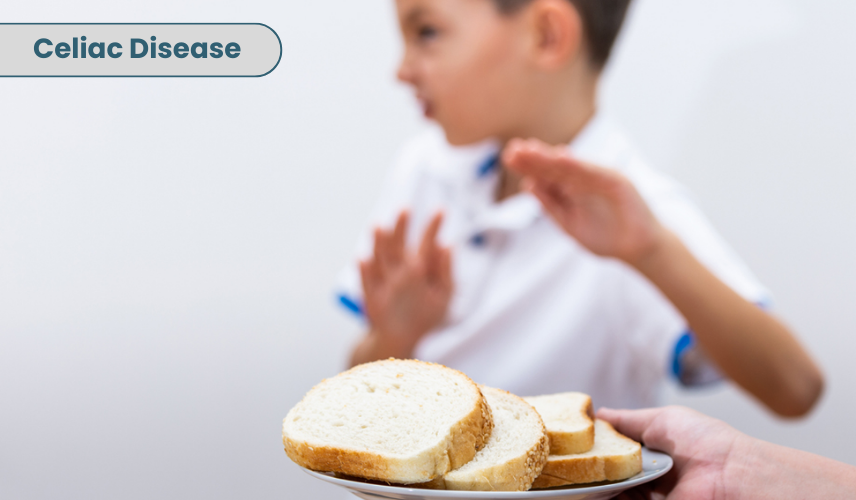
Celiac Disease in Children
What is Celiac Disease?
Celiac disease is a chronic autoimmune condition where the ingestion of gluten—a protein found in wheat, barley, and rye—triggers an immune response that damages the small intestine lining. This damage interferes with the absorption of nutrients, leading to a range of digestive and systemic symptoms, especially in growing children.
Who is Affected?
Celiac disease can develop at any age after gluten is introduced into the diet, but it often begins in early childhood. If left untreated, it can lead to growth delays, malnutrition, and other serious health complications.
Common Signs and Symptoms in Children
Symptoms may vary by age:
In Infants and Toddlers:
- Chronic diarrhea or constipation
- Abdominal bloating and pain
- Poor weight gain or failure to thrive
- Irritability or fussiness
In Older Children:
- Fatigue
- Nausea or vomiting
- Delayed puberty
- Skin rash (Dermatitis herpetiformis)
- Anemia (iron-deficiency not responding to treatment)
- Behavioral issues or learning difficulties
Causes and Risk Factors
Celiac disease is genetically predisposed. A child is more likely to develop it if:
- A first-degree relative (parent/sibling) has celiac disease
- There is a personal or family history of other autoimmune diseases (like Type 1 diabetes or thyroid disease)
- The child has Down syndrome, Turner syndrome, or Williams syndrome
Diagnosis
Celiac disease is diagnosed through:
- Blood tests – to check for specific antibodies (like tTG-IgA)
- Genetic testing – to detect HLA-DQ2 and HLA-DQ8 genes
- Endoscopy with biopsy – to confirm damage to the intestinal lining
Note: It is important that the child is on a gluten-containing diet during testing for accurate results.
Management and Treatment
There is no cure, but the condition is effectively managed through:
- A strict lifelong gluten-free diet
- Regular follow-ups for growth and nutritional monitoring
- Nutritional counseling to ensure adequate vitamin and mineral intake
- Emotional and psychological support (especially in older children coping with dietary restrictions)
Why Early Diagnosis Matters
Timely identification and treatment can help:
- Restore normal growth and development
- Prevent long-term complications like osteoporosis, delayed puberty, infertility, and intestinal cancers
- Improve quality of life and school performance
Expert Care with a Child-Friendly Approach
As a specialist in pediatric gastroenterology, I offer:
- Accurate diagnosis using advanced, child-friendly techniques
- Personalized treatment plans tailored to your child’s nutritional and emotional needs
- Guidance for families on gluten-free living, label reading, and meal planning
.png)